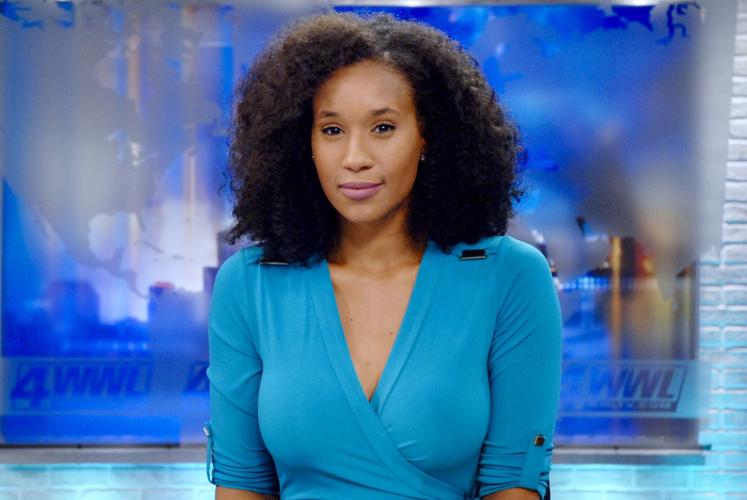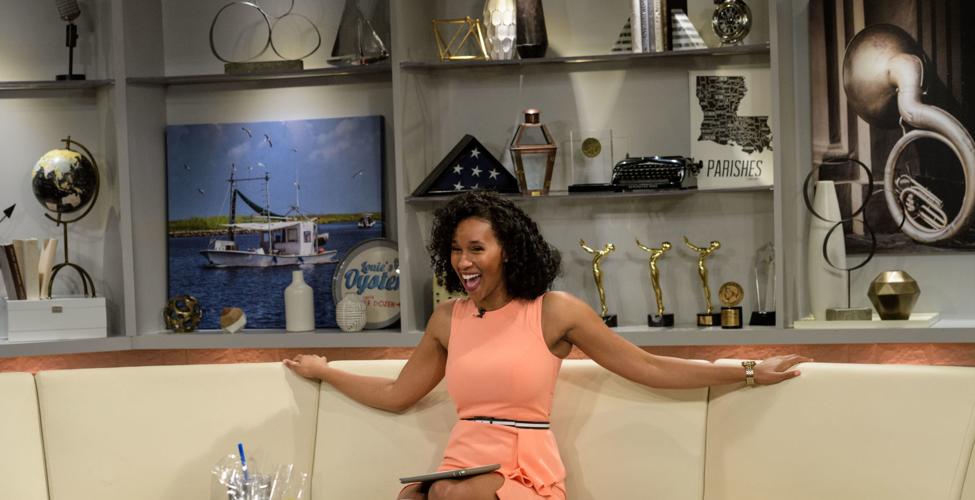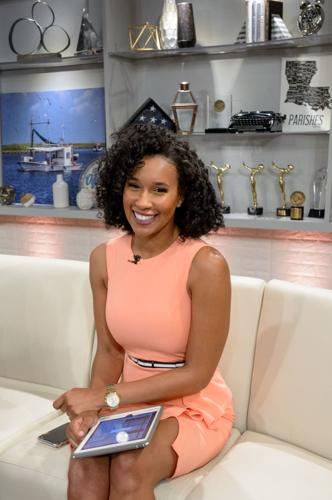For Sheba Turk, it was a personal decision. Nearly two years ago, around Christmas 2017, the WWL-TV morning show anchor decided to do something she’d been wanting to do since the fourth grade: She let her hair grow out naturally.
No more chemicals. No more straightener. No more fighting what Mother Nature gave her.
Last week, that personal decision boiled over into the public sphere after Turk shared on social media a comment from a particularly spiteful viewer, made and received while she was on the air, about her coiffure of choice.
“You have some nerve appearing like that on TV with your hair all whacked out … You look like hell. Straight out of Africa,” read the comment, signed “Mike Everyman.”
Turk’s measured, mic-drop response, which she shared on social media: “Mike says I look ‘straight out of Africa.’ He didn’t mean it as a compliment, but it totally is — so thank you.”

Anchor Sheba Turk on the set of the Eyewitness Morning News in 2018.
That post would end up sparking a lively discussion about race, beauty and what constitutes a professional appearance in 2019.
Along with regular WWL viewers, notable names weighing in to express support for Turk included local musician Sam “Big Sam” Williams, New Orleans City Councilwoman and former broadcaster Helena Moreno, and Chef Kevin Belton, who appears with Turk on WWL.
“Unfortunately, it’s not uncommon,” Turk said Monday of the racist comment that kick-started the whole conversation. “And it comes in many forms: emails, tweets, Instagram comments that will just be randomly like, ‘Your hair is a distraction.’”
Even for someone as confident and positive as Turk tends to be, she admits those kinds of comments sometimes sting. “It doesn’t hurt my feelings, because I like what I look like," she said. "But it is that we live in a world in which people think this.”
Turk, 30, wasn’t always so bulletproof. As a young girl growing up in New Orleans, she said, she wore her hair in an afro, like so many of her pop-culture idols. She began straightening it as a fourth-grader because that’s how she was told black girls were supposed to wear their hair.
When she went into broadcasting, veteran reporters reinforced that notion, urging her to wear her hair straight on the air if she wanted to rise through the professional ranks.
It wasn’t just in the newsroom, either. “I was at the mall once, and an older black woman pulled me aside and said, ‘Baby, we can’t do that,’ ” she said.
Turk's boss, WWL President and General Manager Tod Smith, complimented the grace with which Turk handled the social media comment.
“Obviously, we’d rather be talking about things that are really important to people’s lives,” Smith said, “but when something like this happens, we do feel it is our responsibility to make people aware that things like this exist. Hopefully by having the conversation, it effects real change.”
Efforts to regulate African-American hair have been in the news recently. A controversy ensued a year ago when two black sixth-grade girls were punished at their West Bank Catholic school after staff members accused them of violating a policy against hairstyles “which draw undue attention to the student and cause distractions.”
One child wore braids to her scalp in cornrows, and the other wore hair extensions. The school rescinded its policy, but last week the two families filed suit in federal court, saying the children's civil rights had been violated.
Turk noted that she’s by no means the first black broadcaster to take a stand regarding her appearance. It happened not long ago at a Dallas TV station. It’s happened in Shreveport, in Jackson, Mississippi, and other places.
And the trend isn’t restricted to newsrooms, according to Sybol Cook Anderson, a philosophy instructor who serves as the chief diversity officer at Loyola University in New Orleans.
Anderson pointed to bills signed into law last month in California and New York that ban discrimination based on natural hairstyles.
“I think that as the culture evolves we should expect and ideally support it,” said Anderson, who added that Loyola’s communications programs include conversations on the topic. “So it was nice to hear that WWL was supporting Miss Turk. It seems to me, 20 years, 30 years ago she might not have had that support. So from the outside looking in, it looks like it is evolving.”
For her part, Turk hopes such episodes will strike a chord with women and young girls who might be struggling with self-confidence.
“Love yourself exactly as you are,” she said when asked what message she hopes people take away from her experience. “This is what we look like. It is professional. You can’t define what professional is by a skin color or hair texture.”
Recently, a black female student at Christ the King Elementary School in Terrytown, a private Catholic school, was pulled from class for viola…
The parents of Faith Fennidy, a young black girl sent home from a Terrytown Catholic school this week because of her hair extensions, will mee…
It's said that luck is what happens when preparation meets opportunity. For WWL-TV news anchor Sheba Turk, that meant keeping her eye on the p…










